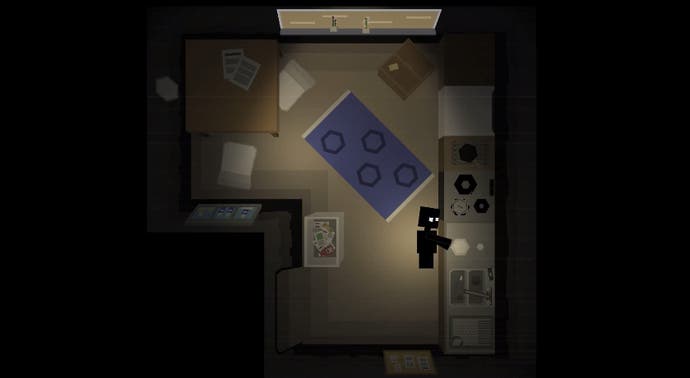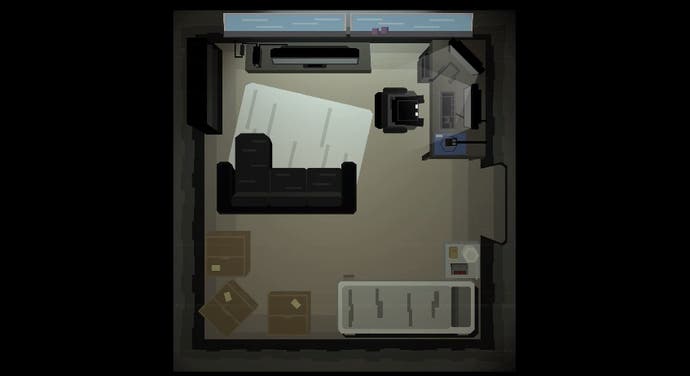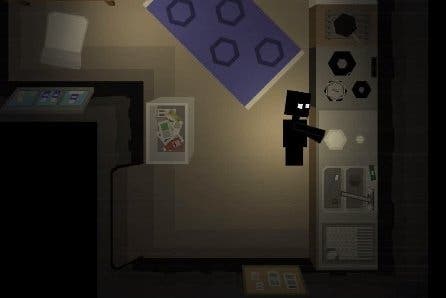Holiday blues: A look at depression simulator Please Knock on My Door
"It is a difficult topic to discuss... which is why I've tried to make it into a game."
With the festive break having been and gone, we've just experienced a joyful season for many with less work, more family, and plenty of presents. But for lots of people, it's a pretty rubbish time of year. Some don't have families, others can't be with them, and some don't get on well with their nearest kin for one reason or another. In short, it can be quite a bummer for many, to put it lightly. But if that's the case for you, you're not alone! Plenty suffer from the holiday blues and Swedish game developer Michael Levall is attempting to capture those feelings of loneliness and isolation in his upcoming psychological mental health simulator Please Knock on My Door.
Described as a "social commentary game about depression, loneliness and phobia," Please Knock will follow the exploits of a despondent gender-neutral person stuck in a rut. Set almost entirely within the confines of a single apartment, Levall's upcoming project will task players with fighting one's inner demons in an a seemingly unwinnable situation. Think of it as an Escape the Room game in which there's no escape.
But the goal of Please Knock isn't to conquer depression; it's to educate. "My aim is to let the player understand what it can be like to live in that kind of situation," Levall tells me over Skype. "It's not to be seen as a tool for the depressed to get better, but more as a tool for a person who perhaps knows someone who suffers from depression, or has in the past suffered from depression, or has been living in a lonely environment to get the feeling that 'hey, this is something I can relate to. I've been there.' Or perhaps the player can see that this is something that their friend is going through and maybe they should go talk to them about it."
Levall explains that about two thirds of the game will be set in the main character's apartment and the only escape from this isolating environment is through the protagonist's dreams. "You're only going to get the parts where he or she is at home. I'm doing it in that way because I want to show the darkest and loneliest parts of this person's life."
So what will the protagonist do in the apartment? A lot of fairly basic stuff, but stuff that's easy to neglect when in a bad state. Things like showering, eating and sleeping, just to name a few. "These are meant to show the passage of time. Because every time you perform one of these interactions the clock - which the players has access to - will move forward. So it will be a kind of time management process for you to allot the time you have in each morning and evening to kind of do the interactions that you feel are most important," Levall notes. "These interactions will affect certain stats that are being saved for the player, and depending on what these stats are, certain events will occur."
While Please Knock will manage the main character's stats, these will largely be kept secret to the player as one's mental state is too obfuscated an issue to be understood at a glance. "I don't want this to be a stats-driven game," Levall tells me. "I don't necessarily want the player to think 'I want to do this and this because I want these stat changes.' What I'd like to do with this game is is to get a certain experience across. That said, I think there could be a certain element to it that could be positive if I were to show the stats only at certain times. Perhaps when the main character goes off to work."
There's an elephant haunting Please Knock's cramped quarters, however: it was less than two year ago that we tackled similar territory in Zoe Quinn's text-based Depression Quest. How will Please Knock differ?
"I would say that Depression Quest is more narratively driven, more along a storyline that's being told to you - kind of like an interactive novel," Levall explains. Please Knock, however, will be structured differently with a wider range of events that are secretly dictated by your choices and actions. "I want to make a pool of different events that tie into the current stats of the main character. So there's never a set timeline or storyline for the player to follow. In a perfect version of this game I'd like the pool of events to be so large that two players could play through the game and not encounter the same events. In reality, though, there might be similarities, but it might happen in different orders depending on the actions of the player."
While a fan of Quinn's experimental interactive prose, Levall's stab at this emergent mental health simulator genre is that it will tackle more than just depression. "Depression takes first seat, but loneliness and phobia are definitely the two other parts that I'll build in this experience," he explains.
The former of those two issues will certainly differentiate it from Depression Quest's more sociable scenarios. "If memory serves me correctly, there were dialogues and conversations in Depression Quest. You get some parts of how the main character talks to people in his or her environment," Levall recalls. "I think at one point you even get the opportunity to reach out. I guess when it comes to us tackling the topic of depression, that would be the largest difference, I think, that in Please Knock on My Door you won't get the option to reach out to people around you because there are none. You have to deal with your own situation to the best of your abilities."

As far as phobias are concerned, Levall is drawing on his own experiences with arachnophobia. The developer explains that he used to not have that strong a fear of spiders, but after living in an apartment that had an issue with large, uninvited eight-legged guests, they started to invade his psyche in a disturbing way. "It went so far that I'd sometimes hallucinate spiders where there were none," he recalls. "So I'm taking that experience as well and pushing it into the loneliness aspect, because I feel like those two combined can make you really vulnerable to depression."
"There will be events where a spider will appear in one manner or another. Early on in the game, the player will be able to take care of it by themselves and it won't be a big deal, but further on that same spider might not be as easily handled because they're in a different state of mind. They are not as brave perhaps. The way that this will affect the player is that the spider will look bigger, which is of course all in the main character's mind, but coming from my own experience that stuff can happen."
Fear of spiders isn't the only thing from his personal life Levall is drawing from, as he says the game actually started as an autobiographical prototype he came up with as a class assignment during his university days.

"I had issues with the state I was in at the time for a few months and so I decided that these feelings I was having and this situation I was in, maybe I should try and work my way through this by making this into something that I could show others. I did a presentation where I talked about my reasoning behind the game prototype and the decisions that I made. That was probably one of the best presentations that I made during university. I got a lot of good praise for it. So after I released my last title, Epigenesis, I decided that I wanted to leave the company I was with at the time and do this by myself."
While a big ego boost in college, it was only recently that Levall took another gander at this old prototype and found himself inspired to flesh it out further. "During this summer I went through my old projects and tried to scour my folder for something fascinating to work with and I found the prototype. I played it and the moment I started it up I got this sensation that I was back in that place. I felt those feelings and I thought, 'I could really do something interesting with this."
These days Levall is in a better mental space, but he recalls the horrors of his bleak university days all too well and the fact that others are going through this is never far from his thoughts. "I of course have a personal tie to this subject matter and some of the parts of the game will be very relatable to me," he says. "And I truly believe that sometimes when you are in these situations you do need someone to come and knock on your door. You need someone to come and help you get out of there. It doesn't have to be a physical knock It can be an abstract knock. Someone to ask you how you're feeling or what's up with you. That knock can take place in many different ways and I think it's important for people to realise that mental illness is a thing that needs to be accepted and talked about."
"I think it's very important for people who live close to someone or love someone who suffers from depression to help them, and not shy away from the topic - because it is a difficult topic to discuss. Which is why I've tried to make it into a game, a social commentary or product that takes an issue from contemporary society and puts it on a wall to display. It kind of shows it off to people and says 'hey, this is important. We should think about this!' And my hope, of course, is that the player will perhaps think differently about depression after playing the game."
Please Knock on My Door has already been accepted on Steam and is expected to come out in late Q1 2015.










